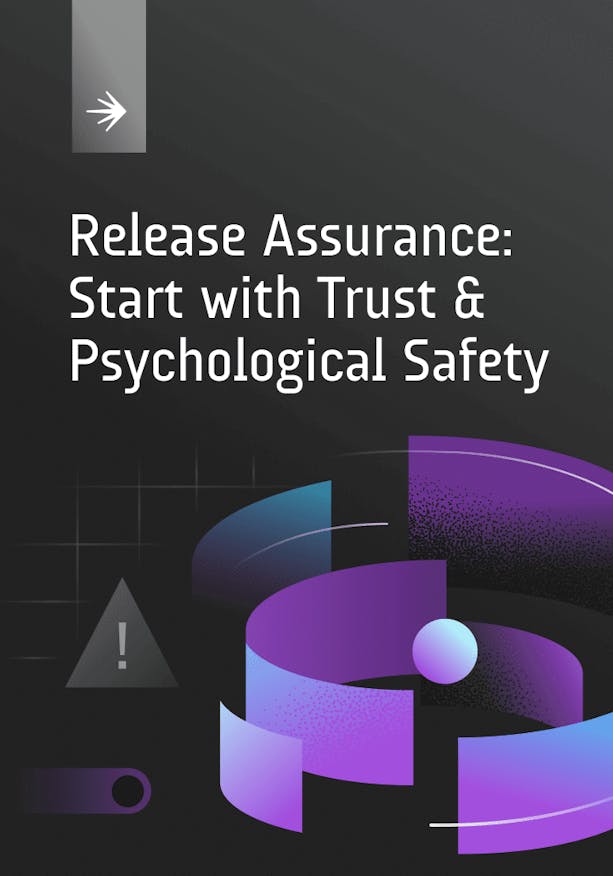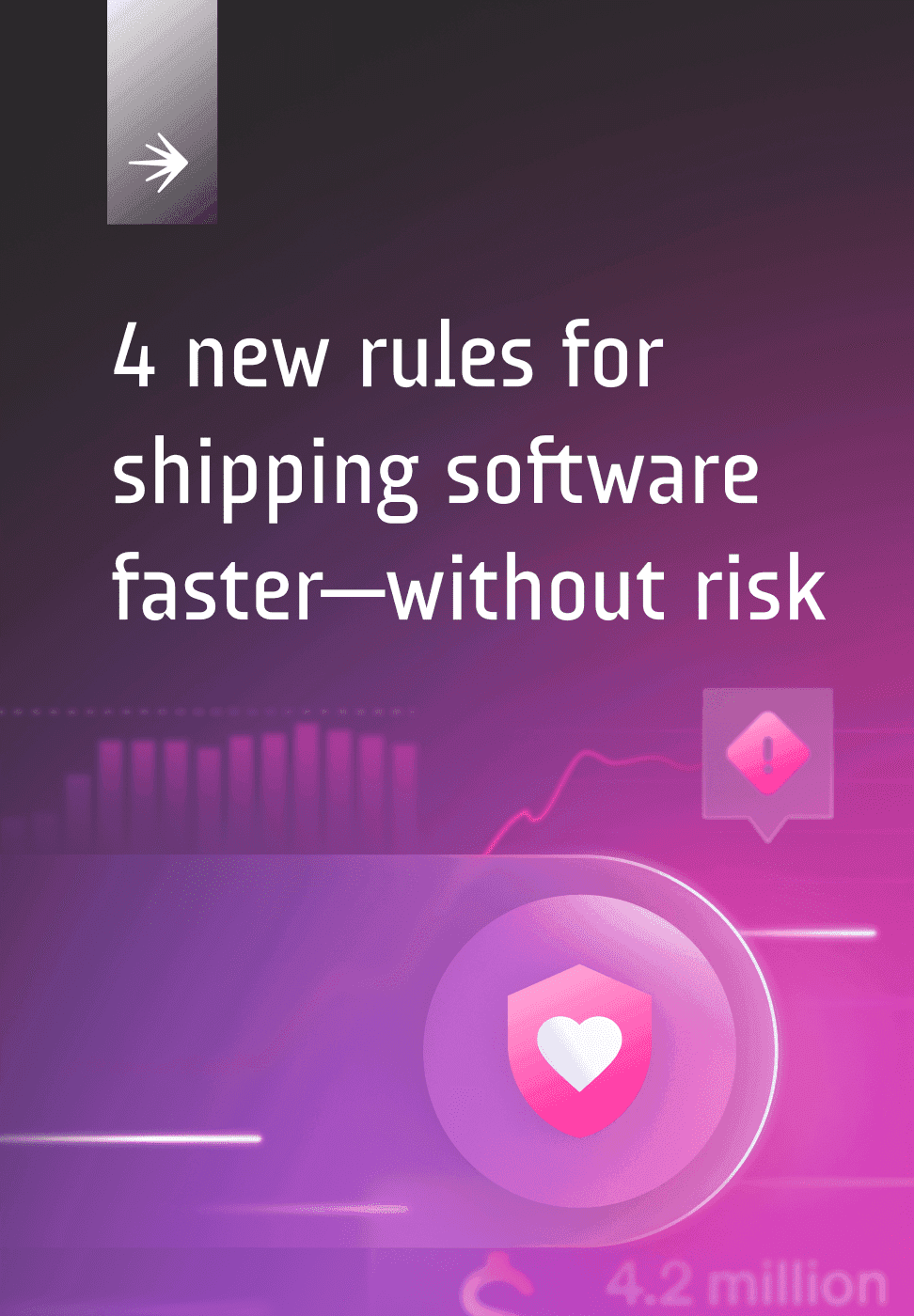Release Assurance
Why Innovative Software Delivery Starts with Trust and Psychological Safety

Strengthening the last mile of software delivery
There are three essential practices that can help your organization increase confidence, risk-taking, and overall performance:
- Smaller, more frequent deployments that help to improve confidence
- Leaders fostering a culture of healthy risk-taking with psychological safety
- Developers feeling rewarded for experimenting
Adopting these practices can enable your teams to deliver more value to the user experience and company bottom line, while sparking innovation through different ways of doing things such as experimentation.
Overall, developers know that rollbacks and risks are part of their job, which is why they want deployment approaches that minimize consequences of rollbacks and disruptions while paradoxically moving more quickly than ever. Developers want psychological safety.
More than half (56%) would feel more confident in the deployment process with smaller, more frequent deployments rather than larger, less frequent deployments. This allows for less consequential rollbacks, as well as provides the space and safety for innovative approaches.
Psychological safety spells huge gains for retention and morale, especially around keeping companies on the cutting edge. Nearly all developers (93%) agree that when they gain confidence in their team’s ability to safely release new code changes to production, they feel empowered to innovate more. The majority (52%) agree with this sentiment strongly.
Nearly half of developers (47%) say applying new development and solutions can lead to improved job satisfaction, and 45% say it improves user experiences.
More frequent, smaller deployments boost confidence
Which of the following would make you feel more confident in the deployment process
Which of the following | % |
|---|---|
Smaller, more frequent deployments | 56% |
Larger, less frequent deployments | 44% |
Smaller releases are more popular with developers, and improve their confidence. To this point, 59% of developers releasing several times a week agree. Sixty percent of the developers in favor of smaller, more frequent deployments also say deploying updates faster puts additional pressure on them than avoiding rollbacks.
How do we square the fact that most developers think more frequent deployments gives them more confidence, but they also rank deploying faster as the main stressor? It could be that the size of the deployments those developers are being asked to release are too large, or that they’re getting pushed to release too fast. It’s tough to say, but there is definitely a balance to be found there.
Another point worth mentioning is that around half of all developers who say their process is at least somewhat of an obstacle to innovation also say larger, less frequent deployments would make them feel more confident. That would make sense, because if your process is already convoluted and taxing, you wouldn’t want to try and do it even more.
Developers want to experiment, and should be encouraged to do so
How important is it for your career to explore new development approaches and solutions?
How important | % |
|---|---|
Essential | 30% |
Very important | 56% |
Somewhat important | 12% |
Not too important | 1% |
Not important at all | – |
86% of developers feel it’s a major priority for their careers to feel free to try new ways of working. Experimenting helps foster innovation, and when there’s clearly so much appetite for this, leadership at organizations should consider feeding it.
How much do you agree or disagree with the following statement: As I gain confidence in my team’s ability to safely release new code changes to production, I feel empowered to innovate more
How much do you agree or disagree | % |
|---|---|
Strongly agree | 52% |
Somewhat agree | 41% |
Somewhat disagree | 5% |
Strongly disagree | 2% |
Still, confidence is needed to take that next step into experimentation and innovation. According to 93% of developers, one of the ways they gain confidence is through their team’s ability to safely release new code.
This seems accurate, because it would be difficult to do a job confidently while knowing the rest of your team isn’t on the same level. It’s up to leaders, then, to hire the right people and put the right processes in place that allows some sense of safety amongst the team to experiment and, hopefully, innovate in the process.
Experimentation fosters innovation and retention
How can applying new development approaches and solutions positively impact business outcomes?
How it impact business outcomes? | % |
|---|---|
Encourages greater innovation among staff | 53% |
Increases adaptability | 52% |
Improves the company bottom line | 49% |
Improves job satisfaction from developers | 47% |
Improves user experiences | 45% |
Other | – |
Applying new development approaches and solutions cannot positively impact business outcomes | – |
Note: Above question was multi-response.
In today’s job market, innovation isn’t just resume filler: it’s an essential differentiator. Virtually all developers (99%) say exploring new development approaches and solutions is at least somewhat important for their career development—including 30% who say it’s essential. Another 56% say it’s very important.
Experimenting and trying new ways of working in safe ways has positive ripple effects that touch almost all aspects of a business.
Wrapping up
Teams feeling empowered through the power of psychological safety to take new approaches, embrace risk, and become fearless will help drive innovation at your organization. And that, in turn, will result in more satisfied leaders, end users, and business results. There’s clearly a disparity among organizations that are prioritizing successful outcomes for their developers versus those that aren’t. And companies that place a high emphasis on improving software quality are viewed as more innovative. But it’s difficult to be innovative when teams are terrified at stepping out of line or bogged down by outdated processes.
Nobody’s saying it’s an easy balancing act releasing quality software while staying hyper-competitive with the speed of releases. You’ll get a lot farther, though, when teams are supported, encouraged, and trusted throughout the process.
Learn more at LaunchDarkly.com.
Guides & Ebooks
See allSign up for our newsletter
Get tips and best practices on feature management, developing great AI apps, running smart experiments, and more.












